
Air Conditioner Fixing: Get Your Cool Back
October 3, 2025
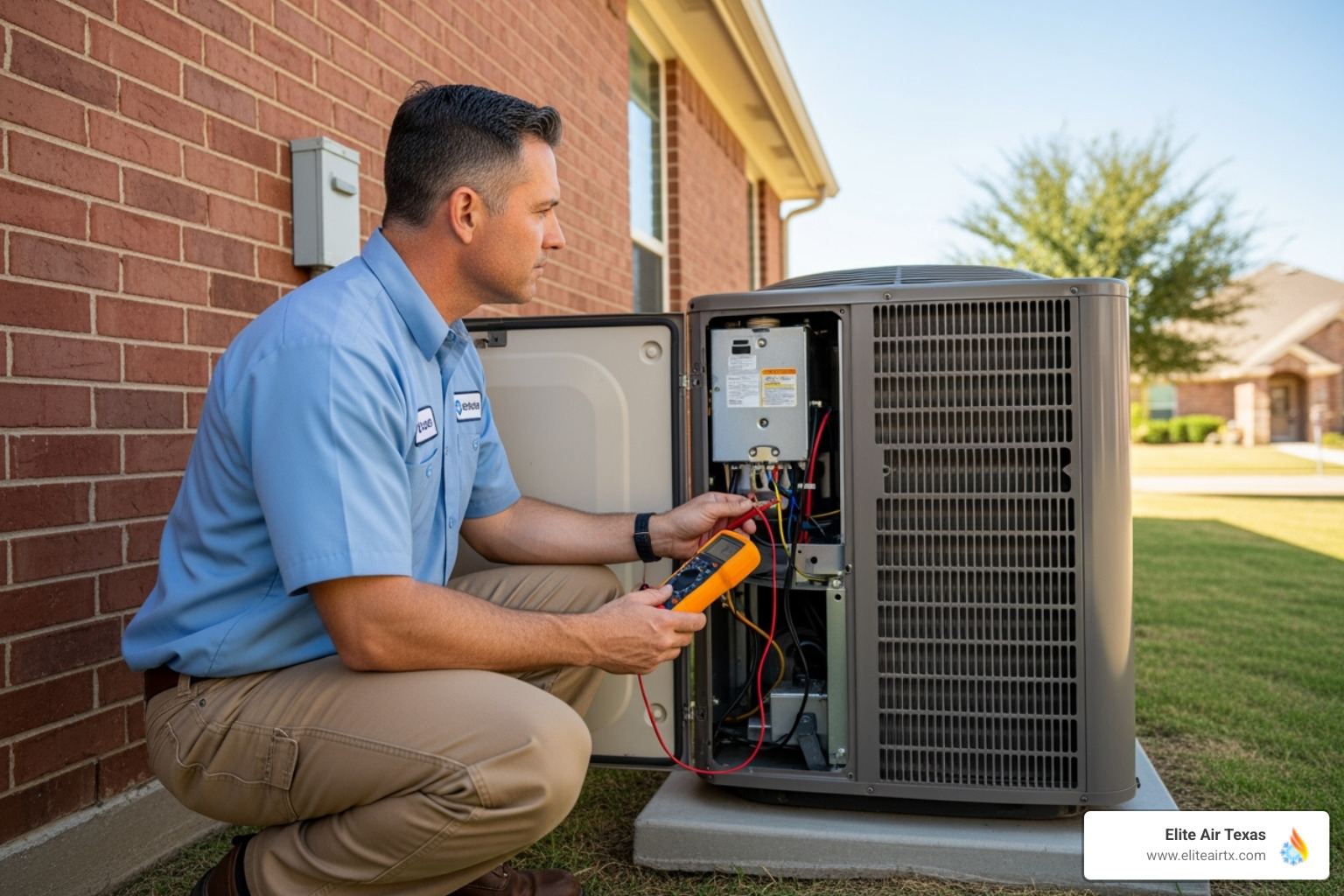
When Your Texas Home Loses Its Cool
Air conditioner fixing can save you from the sweltering Texas heat. When your AC stops cooling, it's more than uncomfortable—it can be dangerous for your family. Here's what you need to know right away:
Most Common AC Problems & Quick Fixes:
- Warm air blowing - Check thermostat settings and air filter
- No air flow - Replace clogged air filter or check circuit breaker
- Strange noises - Turn off unit immediately and inspect for debris
- Water leaks - Clear condensate drain line or check for frozen coils
- Unit won't start - Reset tripped circuit breaker or replace thermostat batteries
The good news is that many AC problems have simple solutions you can try before calling a professional. Knowing when to tackle a problem yourself versus when to call an expert can save you time, money, and prevent further damage to your system.
Some fixes are perfect for DIY troubleshooting, while others require professional expertise to handle safely. Understanding the basics of air conditioner fixing helps you make smart decisions about your home's comfort.
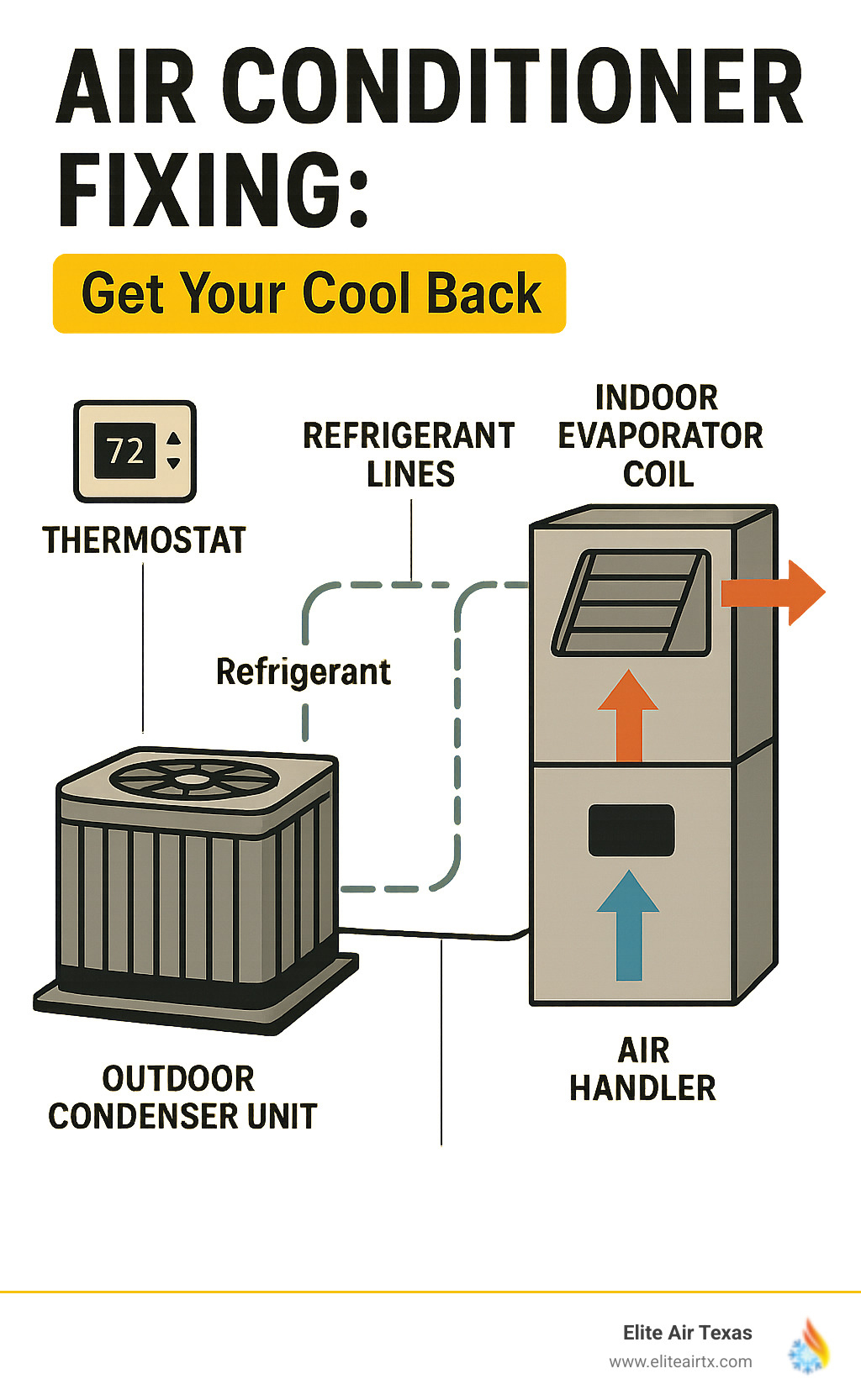
First, Identify the Warning Signs
Learning to recognize your AC's distress signals can save you from a mid-summer breakdown. The key to successful air conditioner fixing is catching problems early, before a minor issue becomes a major headache.
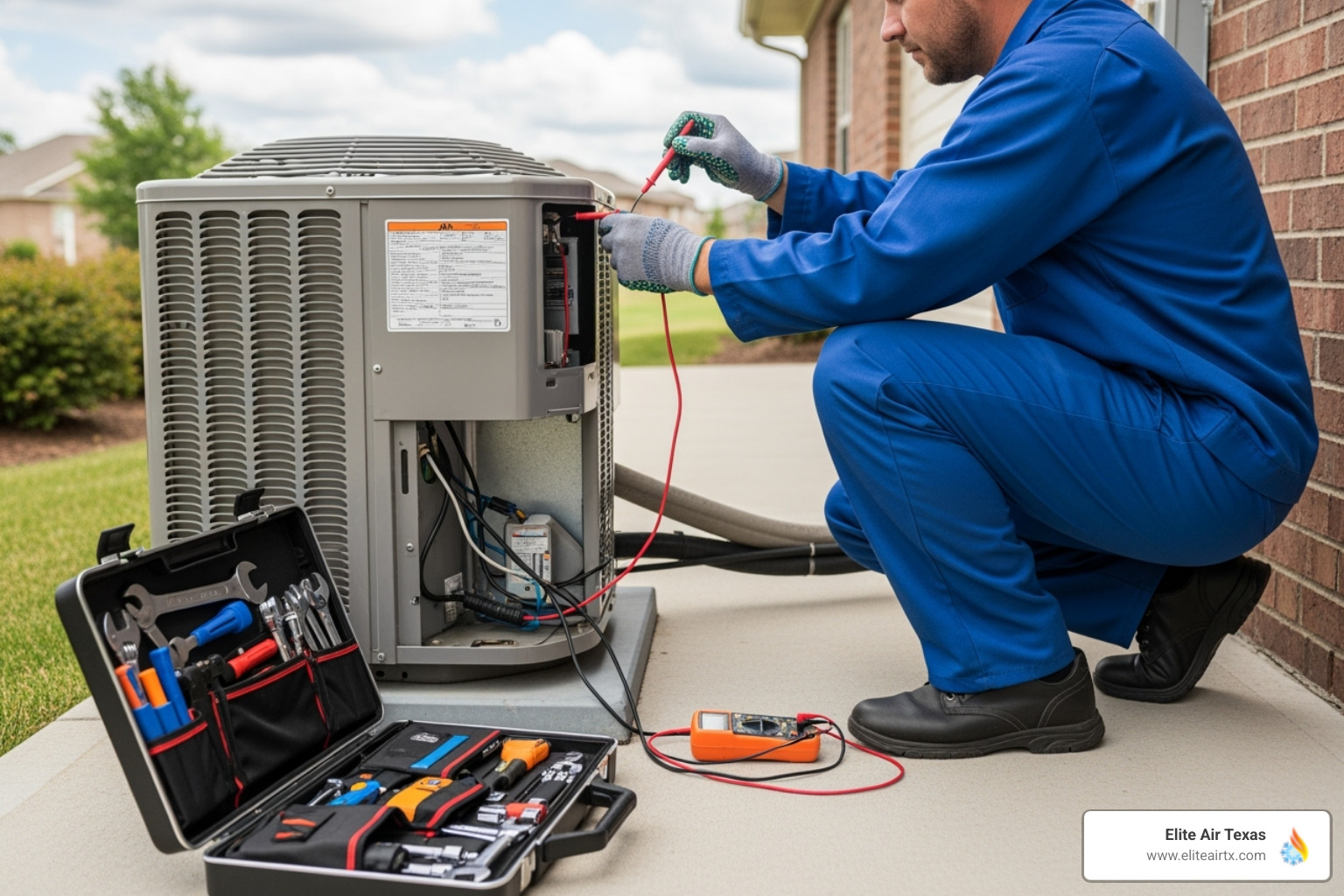
Look out for these common warning signs:
- Weak airflow from your vents often means something is blocking the air's path, like a clogged filter or a struggling blower motor.
- Warm air is the most obvious signal your AC needs help. If you get a puff of warm air instead of a cool breeze, it's time to investigate.
- High humidity means your AC isn't properly removing moisture from the air. If your house feels sticky, something is wrong.
- Frequent cycling (the unit turning on and off repeatedly) means your system is working too hard, wasting energy and causing unnecessary wear.
- Water leaks around your indoor or outdoor unit are never normal and need immediate attention to prevent water damage.
- Strange noises beyond a gentle hum should be addressed immediately. Your AC shouldn't be buzzing, grinding, or squealing.
- Bad odors can signal mold growth or electrical problems that need to be fixed.
Understanding these AC Problems That Require Attention helps you maintain your system's health.
Your AC is Blowing Warm Air
When your AC blows warm air, start with the thermostat settings. Ensure it's set to "cool" and the temperature is lower than the current room temperature.
Low refrigerant is a common culprit. Refrigerant absorbs heat from your home, and if levels are low due to a leak, your unit can't cool effectively.
Dirty coils on your indoor or outdoor unit can also block heat transfer, preventing your system from cooling properly.
For a deeper dive, check out our guide on How to Fix AC Cold Air Blowing Issues.
The Unit is Making Strange Noises
Unusual AC noises are a clear sign of trouble. Different sounds point to different issues:
- Buzzing often indicates an electrical problem, such as loose wiring or a failing motor.
- Grinding usually means worn-out motor bearings in the indoor or outdoor fan.
- Squealing or screeching typically points to a worn belt or motor bearings that need lubrication.
- Continuous clicking can signal a faulty thermostat or a failing electrical component.
Don't ignore these sounds. Our article on What That Strange AC Sound Means can help you decode the problem. For buzzing issues, see Why AC System is Making Buzzing Sounds.
There's a Leak or Excess Moisture
Water around your AC unit is a common issue with straightforward causes. A clogged drain line is the most frequent reason. Your AC creates condensation that should flow away, but this line can get blocked by algae or debris, causing water to back up.
Frozen evaporator coils can also cause leaks. When coils freeze (often due to a dirty filter or low refrigerant), they eventually thaw and release more water than the drain can handle. If you see ice, turn off your system immediately to let it thaw.
If you spot a water leak, turn off the system to prevent water damage and mold growth. For more help, see our guide on Solving AC Drainage Issues in Summer Heat.
Your Guide to DIY Air Conditioner Fixing
Before calling for professional help, try these simple DIY air conditioner fixing steps. Many common issues have easy solutions that can save you time and money.
Safety first: Always turn off the power to your unit at both the thermostat and the outdoor disconnect switch before starting any work. Your safety is paramount.
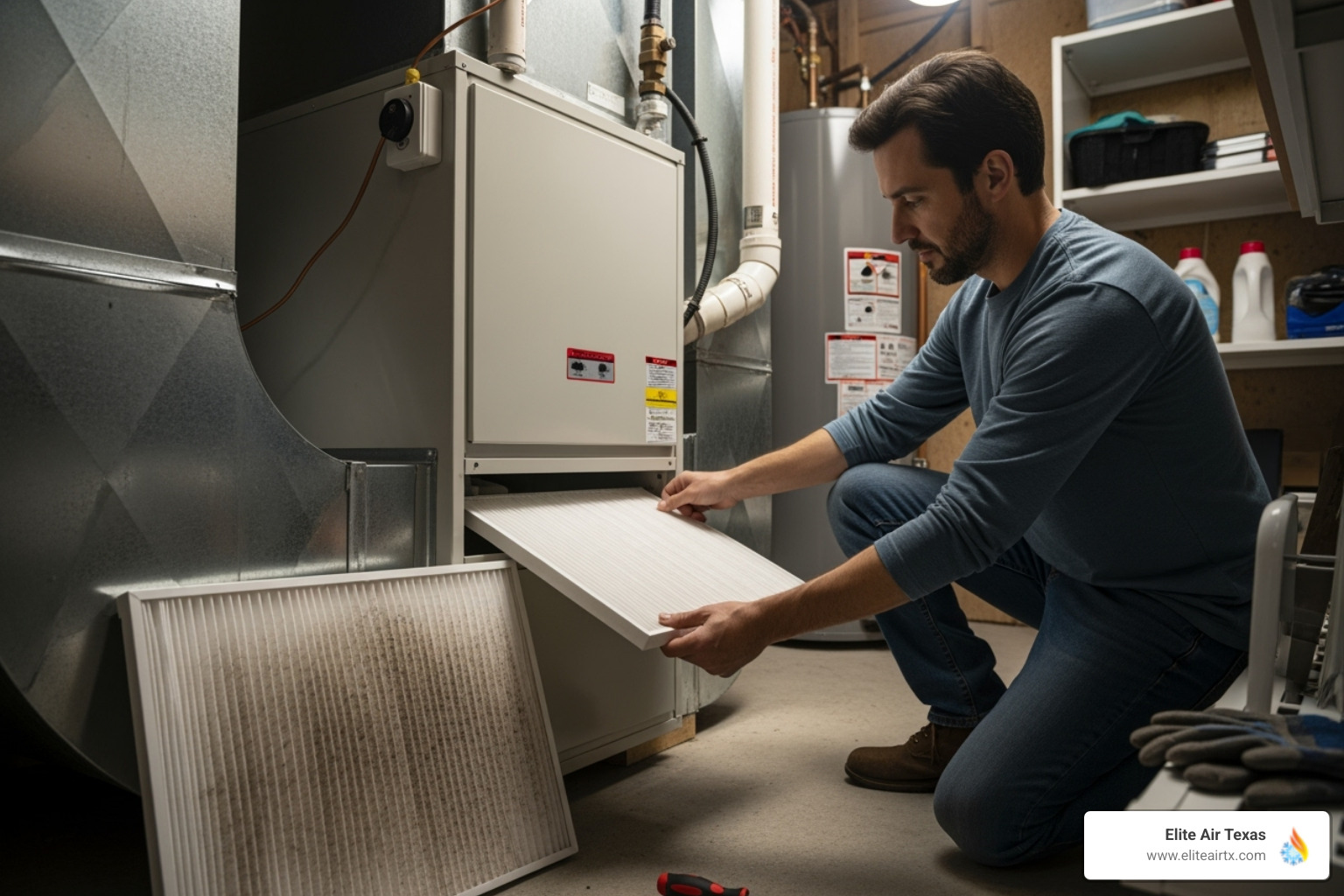
Step 1: Check the Thermostat
A simple thermostat issue can mimic a major AC breakdown. First, make sure it's set to "Cool" mode and that the temperature is set lower than the current room temperature.
Next, check for dead batteries. If the display is dim or blank, new batteries might solve the problem. For smart thermostats, ensure your Wi-Fi connection is active, as a lost connection can disrupt communication. Our AC Thermostat Troubleshooting Guide offers more detailed fixes.
Step 2: Inspect and Change the Air Filter
A clogged air filter is a leading cause of AC problems. When it's filled with dust and debris, your system can't breathe properly, restricting airflow and forcing it to work harder. This reduces cooling power and can lead to frozen coils and higher energy bills.
Fortunately, changing your filter is easy. Most are located in the furnace or air handler. A dirty air filter is a common problem and should be replaced every three months, or more often if you have pets or allergies. A clean filter improves efficiency, lowers energy bills, and provides cleaner air. If airflow issues persist, our guide on Solving AC Airflow Problems has more tips.
Step 3: Check the Circuit Breaker
Sometimes the problem is with the power supply, not the AC unit itself. Air conditioners draw a lot of power, and an electrical surge can cause the circuit breaker to trip as a safety measure.
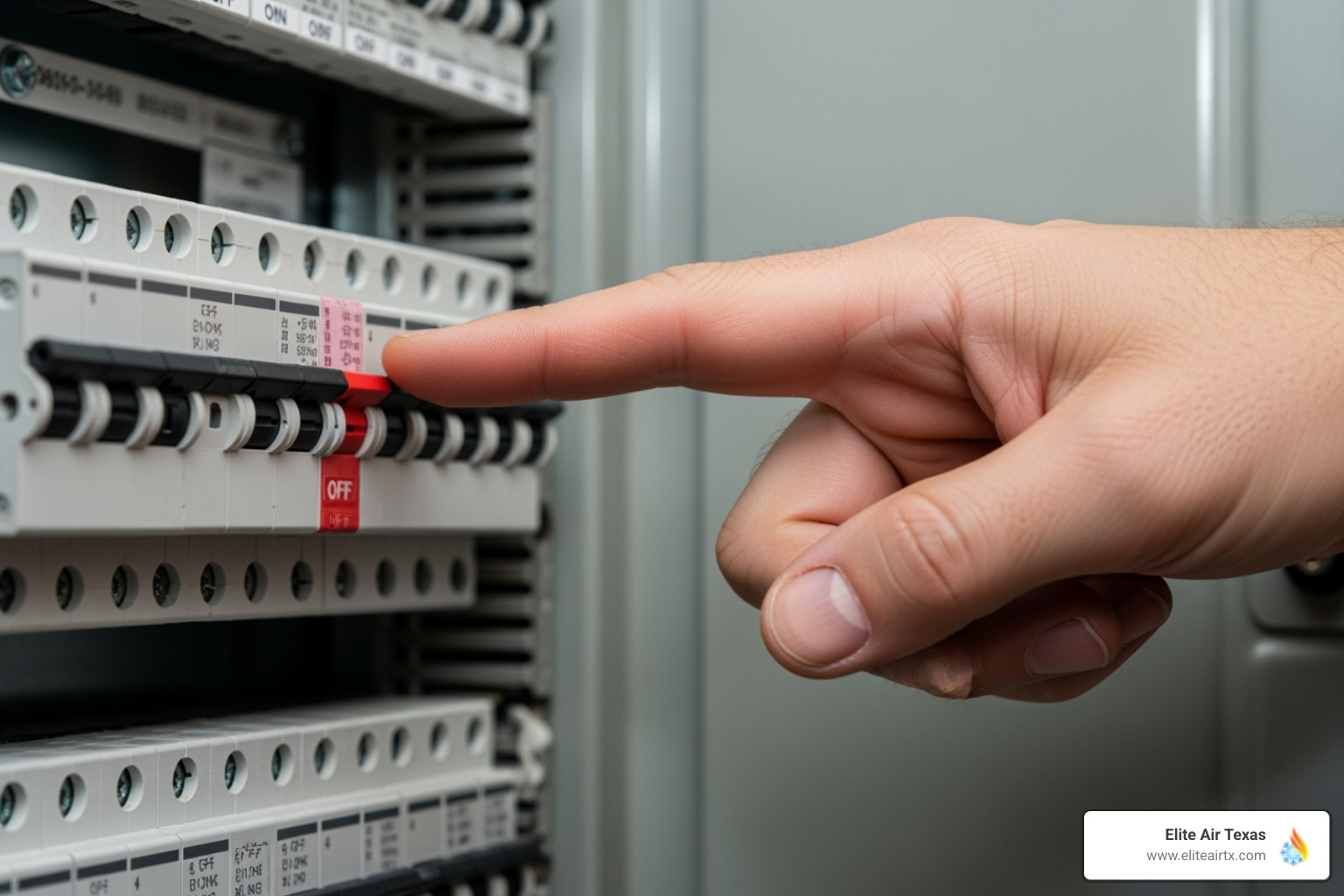
Find your electrical panel and look for the breaker labeled for your AC. A tripped breaker will be in the "off" position or stuck in the middle. To reset it, push it firmly to "off," then back to "on." If the breaker trips again soon after, there may be a deeper electrical issue that requires a professional. Our article on Why AC Circuit Breaker Keeps Tripping explains more.
Step 4: Clean the Outdoor Unit (Condenser)
Your outdoor unit needs clear space to work efficiently. When leaves, grass, and debris build up, it can't release heat properly, much like putting a blanket over an engine.
Make sure the power is off before you begin cleaning. Gently brush away loose debris from the metal fins, being careful not to bend them. Then, use a garden hose to gently spray the coils from the inside out to flush away trapped dirt.
Keep at least two feet of clear space around the entire unit by trimming back any nearby plants or shrubs. Regular cleaning improves efficiency and extends your AC's lifespan. If coils are heavily soiled, you may need professional help. Learn more about Signs AC Coils Need Professional Attention or our AC Coil Cleaning Fort Worth TX services.
When DIY Isn't Enough: Repair vs. Replace
While many air conditioner fixing steps are DIY-friendly, some tasks are best left to professionals. High-voltage electrical components and pressurized refrigerant are dangerous to handle without proper training and certification.
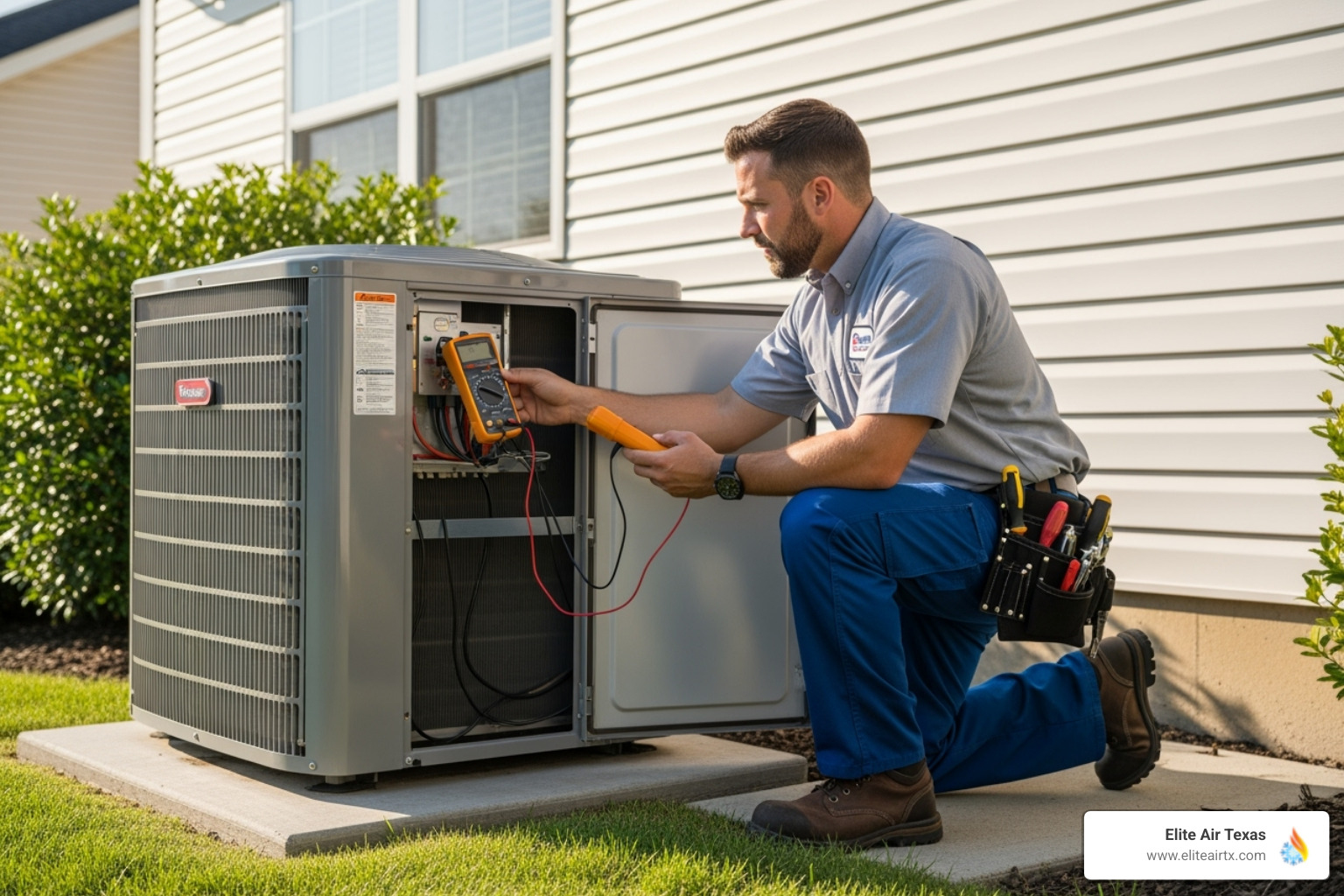
Attempting to fix complex problems like compressor failure, major electrical malfunctions, or refrigerant leaks can cause more damage and create serious safety hazards. Releasing refrigerant is also illegal and harmful to the environment. For certain issues, you need an immediate professional. Our guide on AC Problems That Need Emergency Response outlines when to call for help right away.
Deciding Between Repair and Replacement
When facing a major AC issue, you must decide whether to repair or replace the unit. This decision impacts your comfort and finances for years.
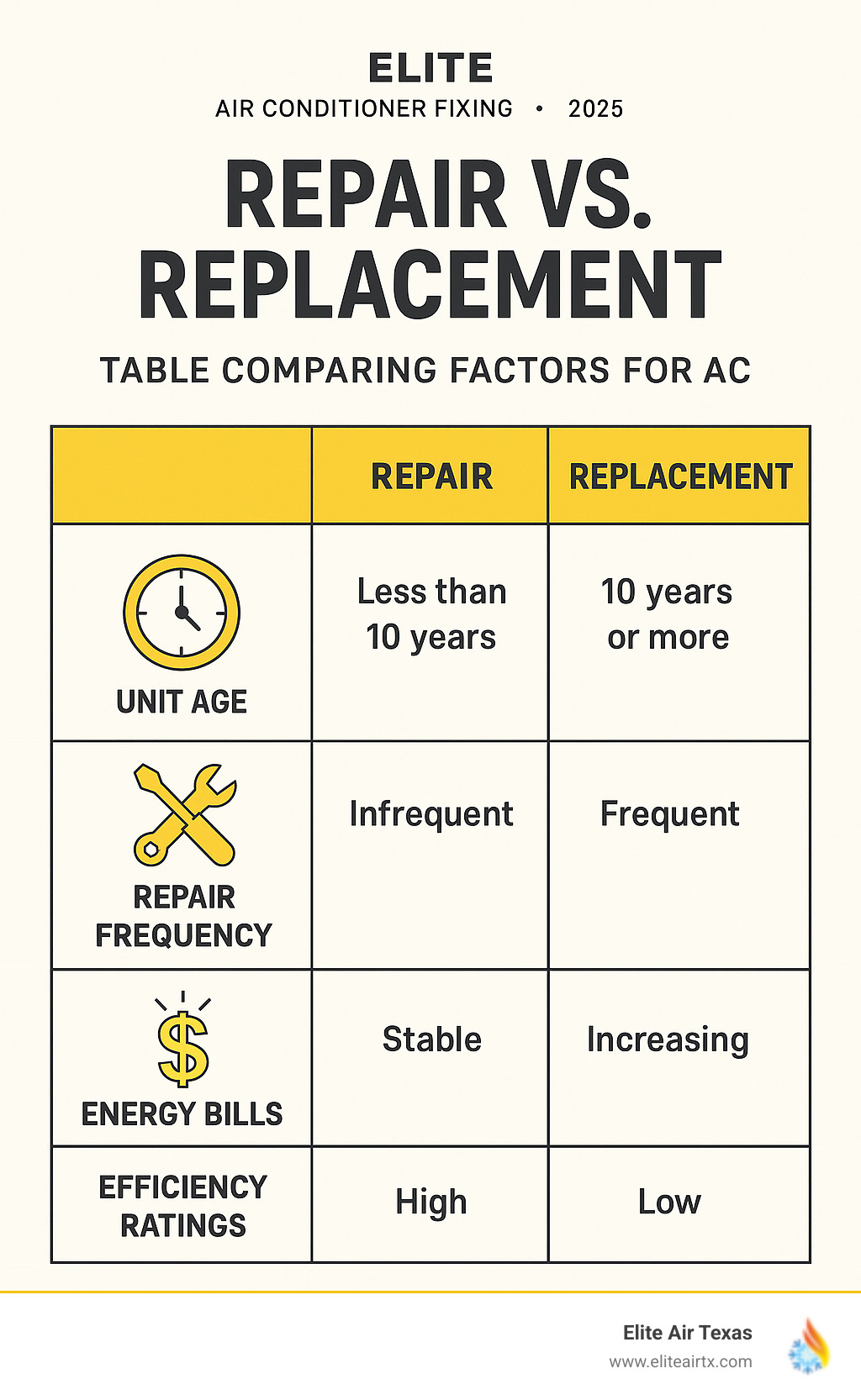
Key factors can help you decide:
- Unit age: The life expectancy of a central air conditioner is about 15 to 20 years. If your system is approaching this age, replacement is often the better choice.
- Repair frequency: If you need frequent repairs, replacement may be more cost-effective in the long run.
- Energy bills: Steadily rising bills often indicate declining efficiency. Upgrading a 10-year-old unit can save 20-40% on cooling costs.
- SEER rating: Modern units have much higher SEER (Seasonal Energy Efficiency Ratio) ratings, meaning they use less energy.
A good rule of thumb is if a repair costs more than half the price of a new system, replacement is the smarter investment.
The Impact of Refrigerant Type
The type of refrigerant in your system is a critical factor. Older air conditioners used R22 refrigerant, which was phased out in 2020 due to federal environmental regulations.
If your older R-22 system has a refrigerant leak, a recharge can be extremely expensive because the supply is limited. It often makes more financial sense to invest that money in a new, more efficient system that uses modern refrigerants like R-410A. For more details, see our guide on Troubleshooting Low Refrigerant Symptoms.
How to Find a Reputable HVAC Company
When you need a professional, choosing the right company is crucial. Look for these qualities:
- Licensed and insured: This is non-negotiable and protects you from liability.
- Local reviews: Check Google, Yelp, and the Better Business Bureau for consistent customer feedback.
- Upfront communication: A trustworthy technician explains the problem and your options clearly without pressure.
- Written estimates: Always get a detailed written estimate before work begins to avoid surprise charges.
At Elite Air of Texas, we believe in transparent, honest service. Whether you need Air Conditioning Repair Dallas TX or service elsewhere in our area, our goal is to restore your comfort without the runaround. We offer free second opinions to help you make the best decision.
Frequently Asked Questions about Air Conditioner Fixing
When it comes to air conditioner fixing, homeowners often have the same questions. Here are answers to the most common ones.
Why does my AC unit turn on and off repeatedly?
This is called short cycling. It wears out your system and increases energy bills. Common causes include:
- A dirty air filter restricting airflow, causing the system to overheat and shut down.
- Low refrigerant from a leak, which prevents the system from completing a cooling cycle.
- An oversized AC unit that cools the space too quickly and shuts off before it can properly dehumidify the air.
- Thermostat issues that send incorrect signals to your unit.
For a deeper dive, check out our guide on Why AC System is Short Cycling.
Is it okay to close vents in rooms I don't use?
While it seems logical, closing vents is not recommended. Your HVAC system is designed for balanced airflow throughout your home. Closing vents increases pressure in your ductwork, which can lead to several problems:
- Air leaks through small cracks in your ducts, wasting cool air.
- Damage to your blower motor from the added strain.
- Frozen evaporator coils, which can cause water damage.
Closing vents can damage your system and increase energy bills. It's best to keep all vents open.
What are the benefits of regular AC maintenance?
Regular AC maintenance is a smart investment in your home's comfort system. The key benefits include:
- Improved efficiency and lower energy bills: A clean, well-tuned system uses less energy to cool your home.
- Extended system lifespan: Catching small issues early prevents major breakdowns and can help your system last up to 20 years.
- Fewer emergency breakdowns: Preventive care dramatically reduces the risk of your AC failing on the hottest day of the year.
- Better indoor air quality: Clean components reduce the circulation of dust, allergens, and other contaminants.
Our AC Tune-Up Fort Worth TX program is an investment in your family's comfort and your system's longevity.
Get Your Cool Back with Professional Help
We've covered several air conditioner fixing steps, from identifying warning signs to basic DIY troubleshooting. Simple tasks like changing an air filter can save you from discomfort and unnecessary service calls.
However, there comes a time when you need to call in a professional. Safety should always be your number one priority. When dealing with high-voltage electrical systems, pressurized refrigerant, or complex internal parts, the risks of DIY repair outweigh the potential savings.
Some problems require the trained eye, specialized tools, and expertise that only licensed professionals possess. At Elite Air of Texas, we understand that your home's comfort is about peace of mind. We've built our reputation on affordable comfort and elite service, offering significant discounts, free second opinions, and a comprehensive 10-year labor warranty.
Our experienced technicians approach every air conditioner fixing challenge with a commitment to quality and transparency. We serve communities throughout North Texas, including:
Air Conditioning Repair Fort Worth TX, Air Conditioning Repair Arlington TX, Air Conditioning Repair Aledo TX, Air Conditioning Repair Benbrook TX, Air Conditioning Repair Granbury TX, Air Conditioning Repair Azle TX, Air Conditioning Repair Saginaw TX, Air Conditioning Repair Decatur TX, Air Conditioning Repair Weatherford TX, Air Conditioning Repair White Settlement TX, Air Conditioning Repair Lake Worth TX, Air Conditioning Repair Mineral Wells TX, Air Conditioning Repair Springtown TX, Air Conditioning Repair Hudson Oaks TX, Air Conditioning Repair Cresson TX, Air Conditioning Repair Poolville TX, Air Conditioning Repair River Oaks TX, Air Conditioning Repair North Richland Hills TX, Air Conditioning Repair Anetta TX, Air Conditioning Repair Anetta South TX, Air Conditioning Repair Willow Park TX, or Air Conditioning Repair Holtam City TX.
When complex issues arise, don't hesitate to reach out for professional HVAC repair in Dallas, TX. We're here to help you get your cool back—safely, efficiently, and with the quality service your family deserves.
Ready to Enhance Your Comfort?
Contact our experts today to discover tailored HVAC solutions that fit your needs perfectly.


%201.svg)

